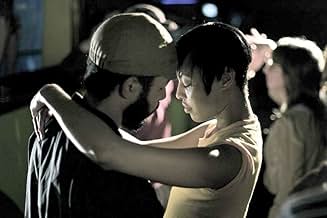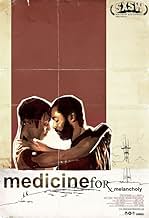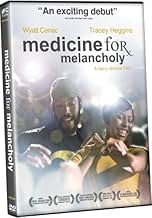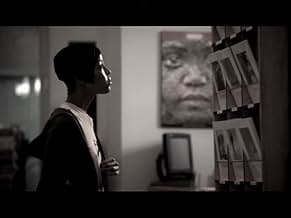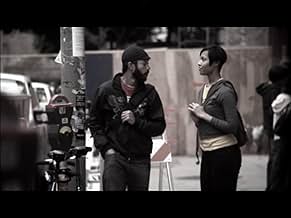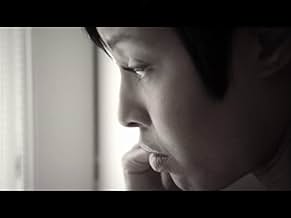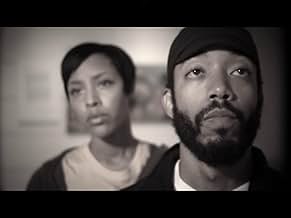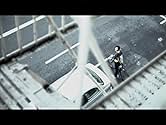IMDb RATING
6.6/10
2.8K
YOUR RATING
Twenty-four hours in the tentative relationship of two young San Franciscans also dealing with the conundrum of being a minority in a rapidly gentrifying city.Twenty-four hours in the tentative relationship of two young San Franciscans also dealing with the conundrum of being a minority in a rapidly gentrifying city.Twenty-four hours in the tentative relationship of two young San Franciscans also dealing with the conundrum of being a minority in a rapidly gentrifying city.
- Awards
- 2 wins & 10 nominations total
Melissa Bisagni
- Sierra Orneilias
- (as Melisa Bisagni)
Chida Emeka
- Hydration Hustler 1
- (as Chidi Emeka)
Ondine Kilker
- Ondine Kilcher - Housing Rights Meeting Attendee
- (as Ondine Kilcher)
- Director
- Writer
- All cast & crew
- Production, box office & more at IMDbPro
Featured reviews
10matty03
I wasn't sure what to expect when I sat down to view this film. I knew it had been filmed here in San Francisco and had won some praise. And, I knew it was low-budget/indie.
However, nothing prepared me for the beauty and quiet power of this film. Aside from the painfully beautiful and realistic performances of the two actors and the story of a stretched out one night stand is something that more than a few of us can relate to/with --- what really makes this film stand out for me is the artistic use of editing and cinematography.
The director has created a sharp and tightly made film. Not in color and not in black and white -- the film really sparkles by use of some form of muted visual effect that works on multiple levels considering the story, emotions, actions and lives of the two characters. The editing is perfect -- creating a pace which is both natural and urgent all at once.
I found this film to be close to perfect and elegant.
I suspect we will see a number of indie filmmakers attempt to copy the style of this film.
How refreshing to see a truly original film which never falls back on cliché or indie film tricks.
I also found the use of San Francisco to be quite clever. The city acts as not only a sort of symbol for various aspects of the characters and their relationship but almost as a third character hovering in every single scene.
This is movie not to be missed!
However, nothing prepared me for the beauty and quiet power of this film. Aside from the painfully beautiful and realistic performances of the two actors and the story of a stretched out one night stand is something that more than a few of us can relate to/with --- what really makes this film stand out for me is the artistic use of editing and cinematography.
The director has created a sharp and tightly made film. Not in color and not in black and white -- the film really sparkles by use of some form of muted visual effect that works on multiple levels considering the story, emotions, actions and lives of the two characters. The editing is perfect -- creating a pace which is both natural and urgent all at once.
I found this film to be close to perfect and elegant.
I suspect we will see a number of indie filmmakers attempt to copy the style of this film.
How refreshing to see a truly original film which never falls back on cliché or indie film tricks.
I also found the use of San Francisco to be quite clever. The city acts as not only a sort of symbol for various aspects of the characters and their relationship but almost as a third character hovering in every single scene.
This is movie not to be missed!
Twenty-four hours in the tentative relationship of two young San Franciscans also dealing with the conundrum of being a minority in a rapidly gentrifying city.
Barry Jenkins has described the film's two main characters as "playing out a debate back and forth about identity politics". Each of the two main characters embodies an ideology. Jenkins saw the character of Micah as a man who was always building barriers, whereas Jo thinks that race is a limiter. Accusing Jo of assimilation, Micah strives to reclaim his essential "blackness" as Jo contrastingly claims Micah has a "hang up" about his race and strives to overcome her own.
Roger Ebert gave the film 3.5 out of 4 stars, calling the actors "effortlessly engaging" and the direction "assured"; he also noted the film was "beautifully photographed". Ebert is right on all counts. The acting is superb, very natural, and really shows off Wyatt Cenac as more than a comedian. The direction is strong, and the cinematography is gorgeous, some of the best you will find anywhere, whether in a big budget film or indie.
The discussion of race is great. As a white man, maybe I can't see the issue from the point of view of Micah, Jo or Barry Jenkins. But I love that there's this divide of ideas. Micah is indignant, as he should be, about being a minority. But Jo prefers to look forward. Indeed, how does one define themselves? I don't think of myself as "white", and sometimes not even as a "man", but do these things define me whether or not I choose to accept them?
Barry Jenkins has described the film's two main characters as "playing out a debate back and forth about identity politics". Each of the two main characters embodies an ideology. Jenkins saw the character of Micah as a man who was always building barriers, whereas Jo thinks that race is a limiter. Accusing Jo of assimilation, Micah strives to reclaim his essential "blackness" as Jo contrastingly claims Micah has a "hang up" about his race and strives to overcome her own.
Roger Ebert gave the film 3.5 out of 4 stars, calling the actors "effortlessly engaging" and the direction "assured"; he also noted the film was "beautifully photographed". Ebert is right on all counts. The acting is superb, very natural, and really shows off Wyatt Cenac as more than a comedian. The direction is strong, and the cinematography is gorgeous, some of the best you will find anywhere, whether in a big budget film or indie.
The discussion of race is great. As a white man, maybe I can't see the issue from the point of view of Micah, Jo or Barry Jenkins. But I love that there's this divide of ideas. Micah is indignant, as he should be, about being a minority. But Jo prefers to look forward. Indeed, how does one define themselves? I don't think of myself as "white", and sometimes not even as a "man", but do these things define me whether or not I choose to accept them?
Micah (Wyatt Cenac) takes Joanne (Tracey Heggins) to the Museum of the African Diaspora on a Sunday afternoon. They woke up that morning in somebody else's house not knowing each other's names after a one-night stand at a party where they both got very drunk. It's San Francisco. They're black. They ride bikes. She was very unfriendly at first, not just because it was a drunken coupling but because she has a white curator boyfriend she lives with who just happens to be in London for the moment, but she loves him.
The first part of this first film by Barry Jenkins, which is shot in digital video tuned to be almost but not quite totally drained of color (like the city, as we are to learn), with pale grays and very white whites, is sustained by Micah's efforts to make Joanne want to spend some time with him. He thinks they ought to get to know each other, and it's a Sunday. She's not at all interested at first. They're both hung over, after all. She lets him take her home in a taxi and then just gets out and runs. But she leaves her wallet on the floor. To go back and find her it takes a search, on his bike, across town, because the address on her license isn't current. The film is also sustained by being very specifically shot in San Francisco. When Joanne goes to a gallery to run an errand it's a very specific gallery. The Museum of the African Diaspora is the Museum of the African Diaspora. The light is San Francisco light. Micah and Joanne are young urban sophisticates. That, as Micah points out, is not only specific but makes them a small minority of a small minority, because gentrification has shrunk the city's blacks to 7% of the city population (New York's proportion is 28%).
Later buying groceries for dinner at his place (because Micah succeeds and Joanne does spend the day with him, and more) they happen upon a group discussing what appears to be the imminent banishment of rent control in San Francisco. Is Jenkins lecturing us, or just treading water? It doesn't matter so much, because the interactions of Micah and Joanne and the wry, cautious words they use when they talk to each other remain central, and are as specific and accurate to who they are (if not to San Francisco) as the cityscapes and the special light.
These two fine actors and this sensitive filmmaker certainly know how to make it real and to record how unpredictably things change from minute to minute. When Micah takes Joanne to the museum, instead of SFMoMA (her original suggestion), and then to the Martin Luther King Memorial at Yerba Buena Center, maybe it's turning into a pretty cool date. But when he leads her over a little bridge there and says, "This is like LA," she just rather coldly says, "Never been," and then, rubbing it in once more and pulling back, "This is a one-night stand." A ride on the merry-go-round at Yerba Buena, she seems to be saying, isn't going to change anything. This delicate homage to a moment is also a rueful acknowledgment of how hard it is to change the way things are.
And it has to be a bit of a lecture, because Micah is "born and raised," while Joanne is a "transplant," and he wants to remind her how the Fillmore and the Lower Haight were wiped out in the Sixties in "Urban Redevelopment:" goodbye black people, goodbye white artists. Micah lives in an immaculate little apartment in the Tenderloin. Micah, as the voice of Barry Jenkins, wants to reclaim San Francisco for everyday people.
Actually, Micah and Joanne seem like a perfect couple. Maybe that's why they can't be together, except just for this one day? You want to just shout out to them, "Can't you just be friends?" They fit so well together. Is this 'Medicine for Melancholy' or just 'melancholy'? Maybe it's medicine 'and' melancholy. That must be it. A fine little lyric of people and a place. And wholly without cliché except maybe for the tagline: "A night they barely remember becomes a day they'll never forget. "
Seen at the San Francisco International Film Festival 2008. This had its debut at SXSW, the South by Southwest Interactive event in Austin, Texas. 'Medicine for Melancholy' tied for the Audience Award for Best Narrative Feature in San Francisco with Rodrigo Pla's 'La Zona.'
The first part of this first film by Barry Jenkins, which is shot in digital video tuned to be almost but not quite totally drained of color (like the city, as we are to learn), with pale grays and very white whites, is sustained by Micah's efforts to make Joanne want to spend some time with him. He thinks they ought to get to know each other, and it's a Sunday. She's not at all interested at first. They're both hung over, after all. She lets him take her home in a taxi and then just gets out and runs. But she leaves her wallet on the floor. To go back and find her it takes a search, on his bike, across town, because the address on her license isn't current. The film is also sustained by being very specifically shot in San Francisco. When Joanne goes to a gallery to run an errand it's a very specific gallery. The Museum of the African Diaspora is the Museum of the African Diaspora. The light is San Francisco light. Micah and Joanne are young urban sophisticates. That, as Micah points out, is not only specific but makes them a small minority of a small minority, because gentrification has shrunk the city's blacks to 7% of the city population (New York's proportion is 28%).
Later buying groceries for dinner at his place (because Micah succeeds and Joanne does spend the day with him, and more) they happen upon a group discussing what appears to be the imminent banishment of rent control in San Francisco. Is Jenkins lecturing us, or just treading water? It doesn't matter so much, because the interactions of Micah and Joanne and the wry, cautious words they use when they talk to each other remain central, and are as specific and accurate to who they are (if not to San Francisco) as the cityscapes and the special light.
These two fine actors and this sensitive filmmaker certainly know how to make it real and to record how unpredictably things change from minute to minute. When Micah takes Joanne to the museum, instead of SFMoMA (her original suggestion), and then to the Martin Luther King Memorial at Yerba Buena Center, maybe it's turning into a pretty cool date. But when he leads her over a little bridge there and says, "This is like LA," she just rather coldly says, "Never been," and then, rubbing it in once more and pulling back, "This is a one-night stand." A ride on the merry-go-round at Yerba Buena, she seems to be saying, isn't going to change anything. This delicate homage to a moment is also a rueful acknowledgment of how hard it is to change the way things are.
And it has to be a bit of a lecture, because Micah is "born and raised," while Joanne is a "transplant," and he wants to remind her how the Fillmore and the Lower Haight were wiped out in the Sixties in "Urban Redevelopment:" goodbye black people, goodbye white artists. Micah lives in an immaculate little apartment in the Tenderloin. Micah, as the voice of Barry Jenkins, wants to reclaim San Francisco for everyday people.
Actually, Micah and Joanne seem like a perfect couple. Maybe that's why they can't be together, except just for this one day? You want to just shout out to them, "Can't you just be friends?" They fit so well together. Is this 'Medicine for Melancholy' or just 'melancholy'? Maybe it's medicine 'and' melancholy. That must be it. A fine little lyric of people and a place. And wholly without cliché except maybe for the tagline: "A night they barely remember becomes a day they'll never forget. "
Seen at the San Francisco International Film Festival 2008. This had its debut at SXSW, the South by Southwest Interactive event in Austin, Texas. 'Medicine for Melancholy' tied for the Audience Award for Best Narrative Feature in San Francisco with Rodrigo Pla's 'La Zona.'
I have no idea what these other reviewers are talking about. Usually these types of glowing reviews are sneaked in by people associated with the film to "prop it up" on the web. This is a painfully slow, bleak looking amateurish "student film" grade bore, topped with an implausible feeling. Forced, pretentious performances especially on the part of the girl played by the amateurish Tracey Heggins. I couldn't keep watching it after the first 10 minutes. I've seen too many of these where you're hoping against all hope that the film will get better - it doesn't 99% of the time so give it up now. I really can't understand what the fuss was about regarding this film on the festival circuit.
You couldn't make a movie that looks more like my day to day life in San Francisco than this. Telling the story of two black twenty-somethings who meet and have a one night stand, they start off the morning after in Bernal Heights, walk over to Noe Valley for breakfast, hop a cab to the Marina to drop her off, then he heads back to his studio on Geary at Hyde, two blocks from where I once rented a nearly identical apartment, down to the rotating walk-in closet door that once sported a Murphy bed. The couple meet again and head to the Museum of the African Diaspora on Mission and then over to Yerba Buena Gardens to ride the merry-go-round, both a block away from where I work. Later that night they buy stuff for dinner at Rainbow Grocery then head down to the Knockout to dance while my pal DJ Paul Paul spins 45s although his oldies singles are overdubbed on the film's soundtrack with obscure but cool indie rock. But aside from the pleasure of seeing all my usual haunts captured on on film, or digital video rather, Medicine For Melancholy is a smart movie that captures not only the vibe of life in downtown San Francisco, but also the subtleties of the changing ethnic and economic demographics of the second most expensive city in the country. The guy—played by Wyatt Cenac, an occasional correspondent on John Stewart's Daily Show—has a deadpan quarrelsomeness that is occasionally hilarious, because not only is he concerned about the ongoing disenfranchisement of the black community in the city, he's also bugged about the pending disenfranchisement of himself from the girl's pants once her live-in boyfriend returns to town. Her boyfriend, by the way, is white, which Cenac's character tries to elevate to a political issue because of his looming romantic frustration, but she's not having it, which leads to one of the film's best exchanges as they argue about the role race plays in forming their sense of self-identity. Lots of clever relationship stuff, like surreptitiously scoping out each other's MySpace profiles and sharp naturalistic dialogue as they continually negotiate and renegotiate the emotional boundaries and ending point of their one day affair. And maybe the scene with the housing activists meeting was a digression, but you know what, if you live here that stuff is very important and on everybody's mind, and it fits nicely given the context of the film whether you like it or not. Highly recommended.
Did you know
- TriviaMade on a budget of $13,000.
- Crazy creditsEach song in the soundtrack appears in the credits with a still frame from the part of the movie where it was used.
- How long is Medicine for Melancholy?Powered by Alexa
Details
- Release date
- Country of origin
- Official site
- Language
- Also known as
- Remedio para melancólicos
- Filming locations
- Production companies
- See more company credits at IMDbPro
Box office
- Budget
- $13,000 (estimated)
- Gross US & Canada
- $111,551
- Opening weekend US & Canada
- $12,625
- Feb 1, 2009
- Gross worldwide
- $111,551
- Runtime
- 1h 28m(88 min)
- Color
- Aspect ratio
- 1.78 : 1
Contribute to this page
Suggest an edit or add missing content





